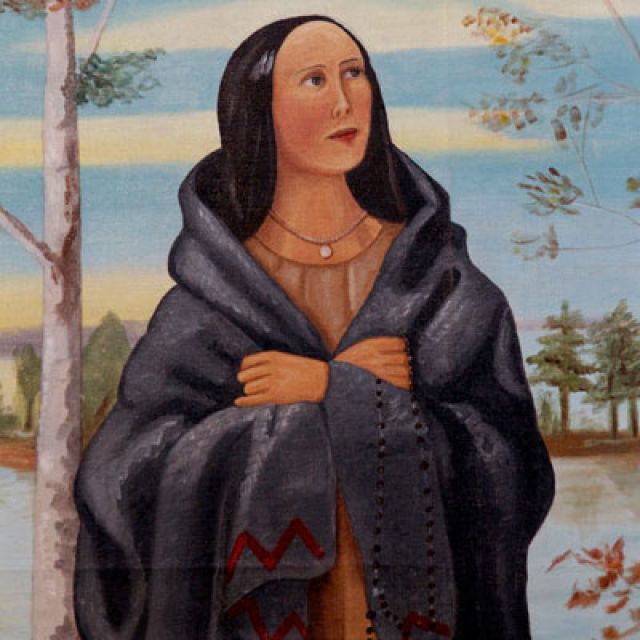, the Canadian Conference of Catholic Bishops offers the following message for the 12 December 2012 Day of Prayer in Solidarity with Indigenous People:
Saint Kateri Tekakwitha: A model for loving and following Jesus
This year, through the miracles of God and the prayers of the Church, we are celebrating the solemn declaration that Kateri Tekakwitha is a saint and model for all Christians. What meaning does her life and death have today? Her message is the same that Jesus the Christ proclaimed 2000 years ago, and which he continues to teach us today.
The heart of Our Lord’s teaching is found in the Beatitudes (Matthew 5.3-11; Luke 6.20-23). Their light shines brightly in the Blessed Virgin Mary and the saints. It is this light that the Church also recognizes in Kateri. This message of Jesus is daily and eternal, inviting us to decide how to respond to the deepest desire for happiness which God has placed in our heart.
Blessed are the poor in spirit, for theirs is the kingdom of heaven. Kateri lived simply and austerely, searching how to love Jesus and at the same time be faithful to the traditions of her people. Blessed are they who mourn, for they will be comforted. All her life, she was weak, scarred and partially blind because of the smallpox which had killed her parents and a younger brother when she was between four and six years old.
Blessed are the meek, for they will inherit the earth. Already as a young girl, Kateri learned to carry firewood and fetch water, to make soup and bread. Later, she used sticks to make crosses, a sign of Christ’s mercy, and place these in the woods. Her prayer at death was as simple as her life itself: “Jesus, I love you.” Blessed are those who hunger and thirst for righteousness, for they will be filled. Kateri participated in the winter hunts, and worshipped God in the woods and forest. She is recorded as saying, “My body is served most luxuriously in the forest, but the soul languishes there, and is not able to satisfy its hunger.”
Blessed are the merciful, for they shall obtain mercy. Kateri taught the young, and assisted the sick and elderly. She refused to speak ill of others. Although infirm, she was always the first to work. Blessed are the pure in heart, for they shall see God. She insisted on making a promise of perpetual virginity, and wanted to form a community of Sisters who would all be Aboriginal women. “I have consecrated myself entirely to Jesus, son of Mary,” she said.
Blessed are the peacemakers, for they will be called children of God. Kateri is described as joyful, patient and always wanting to help others. She would ask, “Who can tell me what is most pleasing to God that I may do it?” Blessed are they are persecuted for righteousness’ sake, for theirs is the kingdom of heaven. After her baptism, she was derided for becoming a Christian, outcast from her native village, and so ended her years at a mission. Blessed are you when people revile you and persecute you and utter all kinds of evil against you falsely on my account. Rejoice and be glad, for your reward is great in heaven. Ridiculed because of her baptism, she sought refuge over 300 kilometres away, walking through woods, rivers and swamps.
When she was beatified in 1980, Blessed John Paul II described Kateri as “a kind, gentle and hardworking person, spending her time working, praying, and meditating”. In the last months of her life, he said, we continue to see a woman of “solid faith, straight-forward humility, calm resignation and radiant joy, even in the midst of terrible sufferings.”
This past October, when Kateri was canonized, Pope Benedict XVI said she had led a simple life, remaining faithful to her love for Jesus, to prayer and to daily Mass. “Her greatest wish was to know and to do what pleased God,” the Pope continued. “She lived a life radiant with faith and purity. Kateri impresses us by the action of grace in her life, in spite of the absence of external help, and by the courage of her vocation.”
Pope Benedict has entrusted the renewal of faith in the First Nations and of all North America to Saint Kateri Tekakwitha, “Protectress of Canada”. In the words of the Holy Father, may she, with all the saints, be a witness to us of lives “generously spent for love of Christ,” strengthening and sustaining the whole Church and each of us in our mission of proclaiming the Gospel. For as Jesus said when concluding his teaching on the Beatitudes (Matthew 5.13,14), we are called to be the salt of the earth and the light of the world.
For further information and reflection
The following homilies and newspaper article from earlier this year (listed in chronological order) offer further information and reflection on Saint Kateri Tekakwitha. She was born in 1656 in what is now the Diocese of Albany in New York State, and died on 17 April 1680 at the Jesuit mission village of Kahnawake, south of Montreal in New France, in what is now the Diocese of Saint-Jean-Longueuil.
1. Father Thomas Rosica, C.S.B. “Blessed Kateri Tekakwitha: Mohawk Mystic of North America, Model of the First Evangelization and New Evangelization”, published originally in L’Osservatore Romano, English-language edition, 7 March 2012.
2. Pope Benedict XVI, Homily at the Mass of Canonization, Saint Peter’s Square, Rome, 21 October 2012.
3. Archbishop Richard Smith, President of the Canadian Conference of Catholic Bishops, Homily at the Mass of Thanksgiving, Basilica of Saint John Lateran, Rome, 22 October 2012.
4. Bishop Lionel Gendron, P.S.S., from the Diocese of Saint-Jean-Longueuil where Saint Kateri is buried, Homily at the Mass of Thanksgiving, Saint Joseph Oratory, Montreal, 4 November 2012.


